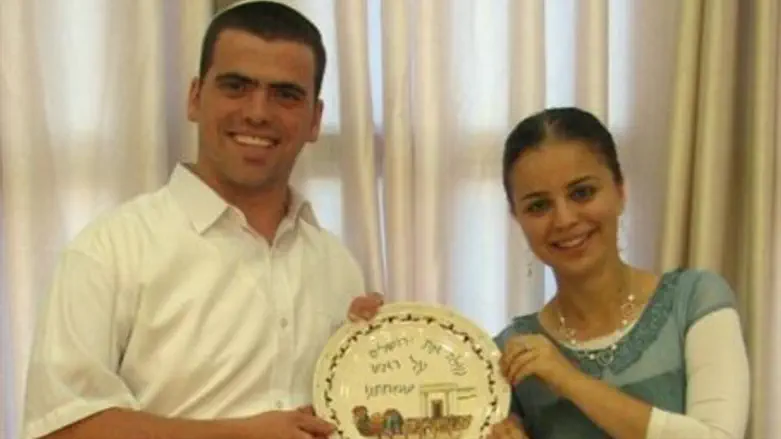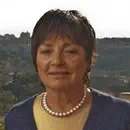
This past Tuesday night hundreds of Ulpana (Torah-oriented girls' high school) students and religious Zionist women of all ages gathered in a Jerusalem wedding hall for an evening of women's spiritual empowerment.
"Women's" because it was an evening stressing the singularity of women, an evening of outreach to the souls of the women of Israel, sending a gentle, steadfast and emotional message that connected to all the women there, and meant to remind them of the wellsprings of faith, prayer and reliance on the Almighty that have been the hallmark of the Jewish woman through the ages.
"Empowerment" - chizuk in Hebrew - because it gave those present and the thousands listening on the two radio stations that broadcast it live, strength in unity, strength to meet the shared and personal challenges that daughters of Israel have met and helped their loved ones overcome throughout Jewish history.
I was asked to attend by Arutz Sheva. As I looked at the hundreds of modestly dressed young women listening attentively to the speakers and singing softly with the groups that came at no charge to create an atmosphere of uplifting song, niggun, my eyes filled with unshed tears at their pain. I was not alone. The wives and mothers in the audience, among them Jewish Home MK Shuli Muallem, herself an IDF widow, had not a dry eye among them.
Because it wasn't an ordinary wedding hall. This past Tuesday night should have been the joyous wedding of Ariel Bigel and Sara Tchiya Litman in that very hall, but the bride-to-be was sitting shiva after the barbaric terrorist attack that murdered her father and brother while on their way to what should have been a joyous aufruf, or what Israelis call a Shabbat Chatan.
The evening was arranged by the Tzvia network of Ulpanas, an educational system guided by the teachings of Israel's first Chief Rabbi, founder of Religious Zionism and the Jerusalem Merkaz Harav yeshiva, Rav Avraham Yitzchak Hacohen Kook. Its rabbis and educators realized that their students were in need of chizuk They understood that although those murdered by the Islamist terrorists were a father and son, these young women identified deeply with a kallah just a few years older than they, a bride whose wedding dress was draped over her arms as she described to Israeli media, sobbing as if her heart would break, how her father had told her how proud he was that she had chosen such a modest gown for her wedding and how he hoped to watch her build a happy, loving home in Israel.
Somehow, hope and optimism, although perhaps not the carefree youthful years that we all would like for our children, had to be restored to the lives of the next generation of Jewish wives and mothers - without negating the national and individual mourning. The evening's program was carefully designed to begin that process.
Yitzchak Meir, popular religious singer, chose his repertoire carefully, singing the Psalmist's words "Yea, though I walk in the valley of death, I will not fear for You are with me," followed by a slow niggun traditionally sung at hassidic weddings which was familiar to all, ending with the Karliner rebbe's plea for G-d's mercy on his flock.
Rabbi of the Kochav Yaakov Ulpana, Eliyahu Sharvit, then read a message of faith from Rabbi Avinadav Abukarat of Givat Shmuel which had gone viral on Israeli internet:
"In a few days time Ariel and Sara Tchiya will be wed.. and all their friends will be there…but those who cannot be seen will also be there..the martyrs who died and sanctified the Name of G-d will be there: Rabbi Eli and Dina Horowitz hy"d of Kiryat Arba will be smiling at the buffet…the eight boys murdered in Merkaz Harav, the groom's yeshiva, will leave the library in the heavens where they are learning Torah so as to dance .. the boys from Otniel, murdered in the kitchen there as they saved the rest of the students, will help serve the meal… and those students of [the groom's late grandfather] Rabbi Silbert's Bnai Akiva yeshiva who fell during their IDF service will recite the blessings… our mentor, Rabbi Kook will be honored with the seventh blessing and his loving eyes will comfort us while he talks about the individual who symbolizes an entire nation…pain and light will be interwoven in the bride's dress, black and white will be knitted into the groom's kippah, the broken glass will mix with the shards of the shattered car window. Yes, the ruins will be rebuilt and our nation wax victorious…"
Rabbi Weiss of the Merkaz Harav Yeshiva High School where Rabbi Litman worked, and whose students were massacred in the Yeshiva library as they studied Torah several years ago, said sadly how his schedule was unchanged. He had planned to be at the hall for the wedding that night, but now his heart ached for the loss of a wonderful educator, a sweet and gentle man of Torah whose eldest daughter was to be wed this week.
"The path to Redemption has highs and lows," he said, "but we must remember the Talmudic story of Rabbi Akiva, who saw a fox at the site of the Holy Temple ruins, desolation that had been prophesied. The Sages accompanying him wept at the sight, but Rabbi Akiva was heartened, saying that if the prophecy of ruin has come to pass, so will that of rebuilding." Pausing, he said: "Eternity conquers death, the light of Torah comforts, and we the Jewish people, are the bearers of this continuity."
The parents of the groom attended and managed to share their feelings. "Our spirits will not be broken," they promised. "Our father Jacob fought with Esau's messenger and when the sun rose, knew he had won. He was injured, he limped, but he continued on. The depth of our pain will be equaled by the heights of the redemption. Remember, the Jewish people have learned to feel joy in the midst of pain."
Ariel's mother added: "I should have been wearing festive clothes this evening, but G-d decided differently; of course the family is on an emotional roller coaster, but despair is not an option for Jews. We must remember how different we are from those who rise to kill us.
"The terrorist opened the back door of the car and Rabbi Litman's young daughter screamed "no,no" and his pistol jammed. She told me later that G-d heard her plea and made it happen. It certainly wasn't that the terrorist had pity on them, nor did the Red Crescent staff who didn't help them – in an inhuman act that they cannot excuse - ever.
"The fact that the Arabs here call themselves Palestinians – adopting the name of the Philistines, a people who arrived here from the Greek isles, who have long disappeared and with whom they have no hereditary connection – is symbolic, because they have also adopted the ways of the ancient Philistines, a cruel and militant tribe who could not bear to see the Jews ruling the land of Israel. It won't do them any good, however, we are here by right, this is our land."
She asked for the song "Even when it seems as though My Presence is hidden, I am there. I stand behind all the difficult times you undergo." We quietly sang along.
The head of the Tzvia educational network rose to talk, but said only that upon seeing the pure faith of the young women in the audience, he realized that this new generation of Jewish women is even stronger than the stalwart one that preceded it and who settled Judea and Samaria.
He was right on the mark. This generation of Israel's religious Zionist women has created their own spiritual and experiential environment and the consciousness of that creation was the most edifying part of the evening.
The men who were present (rabbis, technicians and media people) were politely asked to leave by the emcee, religious media personality, Sivan Rahav Meir, and three acclaimed religious women singers then electrified the atmosphere - performing together for the first time - singing words of comfort and strength in which everyone joined: "Pour out [the feelings in] your heart before G-d," followed by the song of hope "I have fallen but I will rise again", an emotional rendering of "Ko amar Hashem, so says the Lord, I recall the deeds of your youth when you followed Me into the desert…" and the song that embodies longing for the Divine Presence, "I have made you swear, o daughters of Jerusalem, that if you find my Beloved, tell Him that I am sick with love for Him."
The singing brought the students to their feet to take part in a dance that seemed to observers to act as a restorative for the soul.
Rabbanit Yemima Mizrachi closed the chizuk evening with one of the mesmerizing speeches for which she is famed. She then asked each person to place a hand on her neighbor's head to bless her, saying: "There is a chuppah here in this room right now, because a chuppah is love and this room is filled with love. Soon Leah's tears will bring the redemption and Sarah Tchiya will be a bride who merits the love of Yaakov for Rachel."
The wedding will take place next Thursday, please G-d, and the couple have invited all of Israel to dance with them at 10 p.m., pledging to build a home of kedusha and simcha, sanctity and joy, as Sara Tchiya's father would have wished them to. I am confident that the very same students of the Tzviya Ulpana network will be there, joyfully dancing with the bride. Mazal tov.
